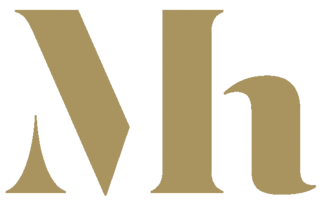
The Mauritshuis is an art museum in The Hague, Netherlands. The museum houses the Royal Cabinet of Paintings which consists of 854 objects, mostly Dutch Golden Age paintings. The collection contains works by Johannes Vermeer, Rembrandt van Rijn, Jan Steen, Paulus Potter, Frans Hals, Jacob van Ruisdael, Hans Holbein the Younger, and others. Originally, the 17th-century building was the residence of count John Maurice of Nassau. It is now the property of the government of the Netherlands and is listed in the top 100 Dutch heritage sites.

Lochem is a city and municipality in the province of Gelderland in the Eastern Netherlands. In 2005, it merged with the municipality of Gorssel, retaining the name of Lochem. As of 2019, it had a population of 33,590.

De Stijl, also known as Neoplasticism, was a Dutch art movement founded in 1917 in Leiden. De Stijl consisted of artists and architects. In a more narrow sense, the term De Stijl is used to refer to a body of work from 1917 to 1931 founded in the Netherlands. Proponents of De Stijl advocated pure abstraction and universality by a reduction to the essentials of form and colour; they simplified visual compositions to vertical and horizontal, using only black, white and primary colors.
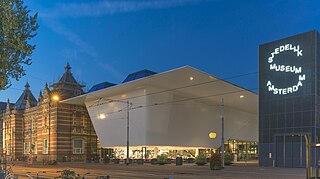
The Stedelijk Museum Amsterdam, colloquially known as the Stedelijk, is a museum for modern art, contemporary art, and design located in Amsterdam, Netherlands.

The Van Abbemuseum is a museum of modern and contemporary art in central Eindhoven, Netherlands, on the east bank of the Dommel River. Established in 1936, the museum is named after its founder, the cigar businessman Henri van Abbe, who loved modern art and wanted his collection to be enjoyed in Eindhoven. As of 2010, the collection of the museum housed more than 2700 works of art, of which about 1000 were on paper, 700 were paintings, and 1000 were sculptures, installations and video works.

Albert Carel Willink was a Dutch painter who called his style of Magic realism "imaginary realism".

Heeswijk Castle is a moated castle near Heeswijk in the Dutch province of North Brabant.

Jan Mankes was a Dutch painter. He produced around 200 paintings, 100 drawings and 50 prints before dying of tuberculosis at the age of 30. His restrained, detailed work ranged from self-portraits to landscapes and studies of birds and animals. His work is now exhibited in his native Netherlands in the Museum Arnhem, Museum Belvédère and Museum MORE.
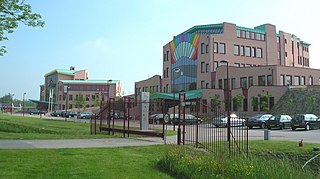
DSB Bank was a Dutch bank and insurer that failed in 2009. Its loans were managed under Quion from June 2013 until June 2016 when Finqus began operating as the former DSB Bank. In 2018 Finqus BV took over DSB Bank and operated as a subsidiary of DSB Group. Finqus BV turned over its loan portfolio to NIBC Bank on 21 July 2021.
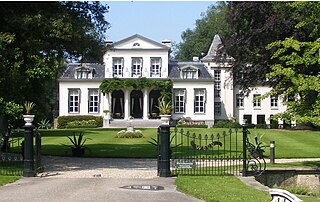
Oranjewoud is a small village in the Netherlands. It is located in the municipality of Heerenveen, Friesland. Oranjewoud had a population of 1570 in January 2017. It is known for Oranjewoud Palace.
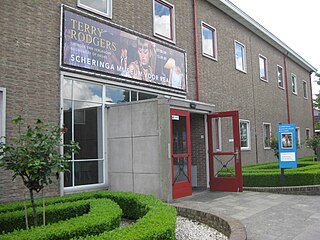
Scheringa Museum of Realist Art was a museum in Spanbroek, North Holland, the Netherlands that housed around five hundred works of the 20th-century art mainly realist art and contemporary. It opened in February 1997 and closed in 2009. The museum was owned by the DSB Bank, and the name refers to Dirk Scheringa, the bank founder.

Museum Fodor is a former art museum in Amsterdam in the Netherlands. The museum was located at the Keizersgracht in Amsterdam-Centrum in the building that currently houses the Foam Fotografiemuseum Amsterdam.

Jeanne van Heeswijk is a Dutch visual artist and curator. Her work often focuses on social practice art, or the relationship between space, geography and urban renewal. She lives and works in Rotterdam in the Netherlands.

Maurice Heerdink is a Dutch painter known mostly for his subtle painted photo-realistic male nude art.

The Zeppelin is a 1933 painting by the Dutch painter Carel Willink. It shows a street corner where four men look up to the sky and wave to a zeppelin.
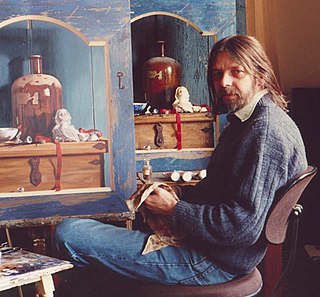
Rob Møhlmann is a Dutch artist, poet and writer of art books. He would predominantly manifest himself as a visual artist, but also wrote several articles, collections of poems, and dozens of books on art. In addition, he started his own museum "to house art that represents something", conceived and organized numerous exhibitions. He would also accumulate a large art collection.

Andreas Johannes Ludovicus baron van den Bogaerde van Terbrugge was a Dutch nobleman, politician, author and art collector. He served as Governor of North Brabant between 1830 and 1842.

The Curaçao Museum is an art and cultural history museum in Curaçao. The museum opened on 7 March 1948, and is the oldest museum in Curaçao which still exists. The museum is located in the former military hospital.

Late Visitors to Pompeii is a 1931 painting by Carel Willink. It depicts four modern men at the forum of Pompeii with Mount Vesuvius in the background. The painting belongs to the Museum Boijmans Van Beuningen since 1933. It has been interpreted in correlation with the cultural philosophy of Oswald Spengler, who is one of the men in the painting, and themes of civilisational crisis in the fiction of Ferdinand Bordewijk.
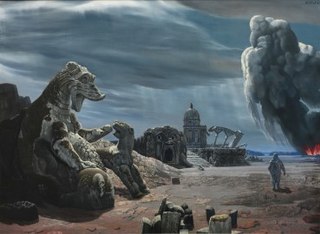
To the Future is a painting made by the Dutchman Carel Willink in 1965. It shows two sculptures from the Garden of Bomarzo and a man in an asbestos suit who walks toward a large explosion. It belongs to a group of late Willink paintings that portray apocalyptic confrontations between modern technology and the ancient world. To the Future is in the collection of Museum MORE in the Netherlands.


























